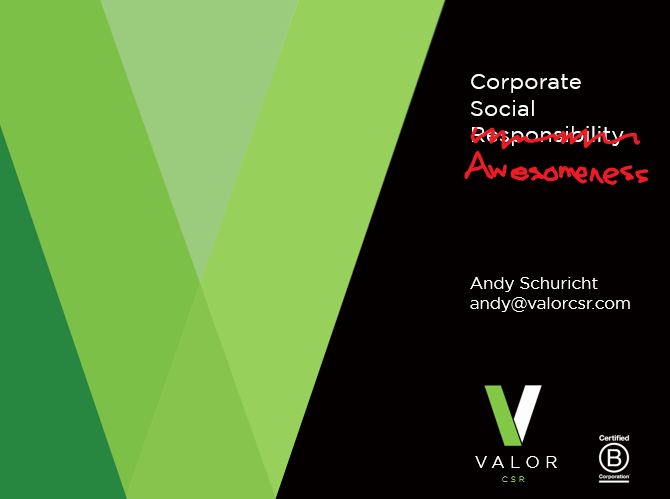As employers, we know that the Covid-19 pandemic will have an unprecedented impact on our employees. From loss of childcare due to school closures, reduction in family income because of a spouse’s layoffs, or the added expense of caring for medically fragile loved ones, our workforces are likely to be under extreme financial pressure. Now you have a way to help.
Taking the "Responsibility" out of CSR
One can be forgiven for being confused about corporate social responsibility. In the January 2015 issue of Harvard Business Review, some really smart people are questioning whether the Porter/Kramer model of identifying social aspects of your value chain is the right way to go. In what feels like a pandering-to-the-CEO kind of article, the authors say that there's a continuum of social impacts, so whatever CSR you do is fine as long as it's coordinated. And also, please pay our consulting company some money to coordinate it for you.
Does CSR encourage bad employee behavior?
In a recent episode of the Freakonomics podcast, Stephen Dubner stated that “customers don’t seem to care all that much” about CSR, and suggested that firms practicing CSR might be encouraging their employees to behave badly because of moral licensing. I thought it might be a good time to clarify things a bit.
Video: CSR 101
The Las Vegas Metro Chamber of Commerce asked us to present a webinar on Corporate Social Responsibility. If you have 20 minutes or so, the video replay is now available!
More Great CSR: Give, by Zappos for Good
Valor CSR is proud to be a part of the B Corp Community
The next frontier in CSR: Lobbying
Some practitioners are concerned that the brand and reputation gains of CSR don't seem to stick around for long. And unfortunately, much of the research on the long term impact of good social performance is focused on edge cases. "Did Deepwater Horizon affect BP's consumer perception around social responsibility?" Um... duh. Yes. The culprit, I suspect, is actually integrity.







